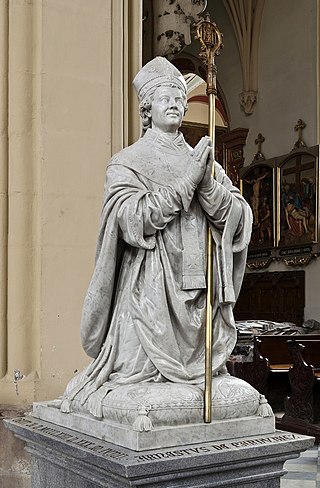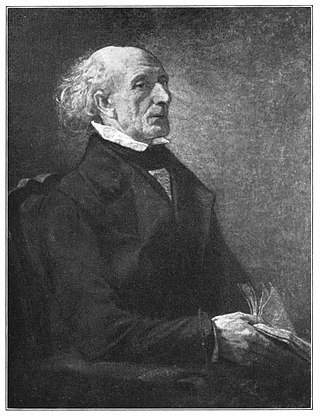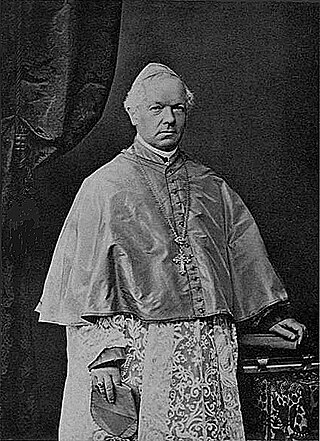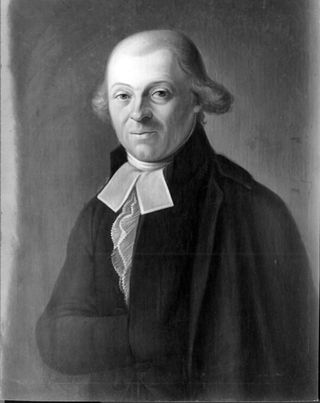Related Research Articles
Matthew of Kraków was a German-Polish scholar and priest of the fourteenth century.

Arnošt of Pardubice was the first Archbishop of Prague. He was also an advisor and diplomat to Emperor Charles IV.

Arbeoof Freising was an early medieval author and the Bishop of Freising from 764.
Clemens Baeumker was a German historian of philosophy.

Friedrich Wilhelm Carl/Karl Umbreit was a German Protestant theologian and a Hebrew Bible scholar.

The Biographisch-Bibliographisches Kirchenlexikon (BBKL) is a German biographical encyclopedia covering deceased persons related to the history of the church, philosophy and literature, founded by Friedrich Wilhelm Bautz, the first volume of which appeared in 1975..

Bertram Otto Bardenhewer was a German Catholic patrologist. His Geschichte der altkirchlichen Literatur is a standard work, re-issued in 2008. For Bardenhewer, a patrologist was not a literary historian of the Church Fathers, but a historian of dogmatic definitions.

Karl Johann Greith was a Swiss Catholic bishop and church historian.
Wolf Wilhelm Friedrich Graf von Baudissin was a German Protestant theologian who was a native of Sophienhof, near Kiel.

Johann Wilhelm Friedrich Höfling was a German Lutheran theologian born in Neudrossenfeld, Bavaria. He specialized in the field of liturgical science.
Gottfried Thomasius was a German Lutheran theologian. He was born in Egenhausen and he died in Erlangen.

Eugen Friedrich Ferdinand Sachsse was a German Protestant theologian born in Cologne.
Wilhelm Heitmüller was a German Protestant theologian, born in Döteberg, presently a division in the town of Seelze.

Johann Friedrich Flatt was a German Protestant theologian and philosopher.
Albert Heinrich Friedrich Stephan Ernst Louis Hauck was a German theologian and church historian.

Sigmund von Birken was a German poet of the Baroque. He was born in Wildstein, near Eger, and died in Nuremberg, aged 55.

Jeremias Friedrich Reuß was a German theologian. He was the father of the philologist and librarian Jeremias David Reuß.

Sigismund Anton Graf von Hohenwart, S.J. was from 1791 to 1794 Bishop of Trieste, from 1794 to 1803 Bishop of St. Pölten, and from 1803 to 1820 he was Prince-Archbishop of Vienna.

Anton Franz Wolfradt, O.Cist., O.S.B. was a Cistercian and Benedictine, Abbot of Wilhering then Kremsmünster, Prince-Bishop of Vienna, and President of the Hofkammer.
Ignaz Franz was a German Catholic priest, theologian and composer of church hymns.
References
- Friedrich Wilhelm Bautz (1990). "Hurter, Friedrich (Emanuel) von, Historiker". In Bautz, Friedrich Wilhelm (ed.). Biographisch-Bibliographisches Kirchenlexikon (BBKL) (in German). Vol. 2. Hamm: Bautz. cols. 1191–1192. ISBN 3-88309-032-8.
- Friedrich Wilhelm Bautz (1990). "Hurter, Hugo von, Jesuit, Dogmatiker". In Bautz, Friedrich Wilhelm (ed.). Biographisch-Bibliographisches Kirchenlexikon (BBKL) (in German). Vol. 2. Hamm: Bautz. cols. 1192–1193. ISBN 3-88309-032-8.
- (in German) Schaff articles on Friedrich and Hugo von Hurter
 This article incorporates text from a publication now in the public domain : F. M. Rudge (1913). "Family of Hurter". In Herbermann, Charles (ed.). Catholic Encyclopedia . New York: Robert Appleton Company.
This article incorporates text from a publication now in the public domain : F. M. Rudge (1913). "Family of Hurter". In Herbermann, Charles (ed.). Catholic Encyclopedia . New York: Robert Appleton Company.